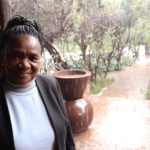© Copyright Bhekisisa Centre for Health Journalism | Privacy Policy | Terms and Conditions | PAIA Manual
Home Search
maternal health - search results
If you're not happy with the results, please do another search
What do parties’ health promises mean? We break it down
Governments have the power to decide whether people live or die when it comes to health. On 29 May your vote will determine how well South Africa’s post-election government will look after your health. Today, we’re launching a series of analyses to break down what parties say they will do to fix the country’s health system.
Big hospital, big boss — Bara ICU’s Rudo Mathivha retires
In July, Rudo Mathivha handed in her notice at Chris Hani Baragwanath Academic Hospital, ending a rightly celebrated 25-year stint as head of the intensive care unit. It was after a truly terrible year. Her story underscores the extent to which quality healthcare for the country’s most vulnerable people remains at the mercy of the indifferent and the corrupt.
From Moshi to Moscow: How a girl from the slopes of Kilimanjaro became Tanzania’s...
In 1969, Esther Mwaikambo became Tanzania’s first female doctor. Today, she is arguably also the country’s most famous. She tells Sean Christie how public healthcare in Africa has changed — and what she wishes for the future.
If your dying baby’s organs could save an adult’s life, would you donate them?
A dying baby’s kidneys could save an adult’s life. But it’s a tough decision — and one few grieving parents are willing to make. Would you?
NHI: The problem with trying to kill two birds with one stone
The National Health Insurance scheme aims to solve two problems — fixing poorly-run health facilities and distributing the money available for healthcare in the country in a more equitable way — simultaneously. But trying to fix two things at once may make things worse, writes Dave Martin.
Inequality didn’t rise from hell: It’s man-made — and there’s nothing like a pandemic...
Why do pandemics such as Aids not automatically end when we have the medicine to control them? Because they play out in a world where inequality frequently prevents drugs from reaching the people who need it most, writes Mia Malan.
How to get ARVs delivered to your home in the rural Eastern Cape
In South Africa’s rural areas, people often face a long, arduous journey to get to a clinic where they can pick up their HIV medicines. Not taking the drugs regularly will mean that the person’s health suffers, which can make it even harder to make the trip. The Bulungula Incubator in the rural Eastern Cape has figured out how to set up a medicine pick-up point closer to people’s homes.
#SliceOfLife: ‘I remember worrying she was cold in the tray.’ My six hours that...
In 2020, 1.9-million children were stillborn according to a new report from the World Health Organisation. Read how one woman’s experience of stillbirth inspired her to start a mental health support group for parents who lost a child during pregnancy.
5 steps, fast: This plastic sheet and pouch can stop thousands of women from...
Researchers have found a way to slash life-threatening bleeding after birth by 60%, according to a study presented at the International Maternal Newborn Health Conference in Cape Town last week.
‘She can’t discern jam from Vaseline’: Advice for the children of Alzheimer’s patients
In South Africa, a gene test that will tell you if you’re at risk for Alzheimer’s disease costs R3 600. But major organisations warn people against using these home kits without also getting counselling to help them work through the results — regardless of the outcome.
Could new abortion rules in the US affect the world’s biggest state HIV fund?
The United States government has appointed the first African head of its Aids fund, Pepfar. John Nkengasong, a Cameroonian virologist with US citizenship, will need to establish the potential impact of America’s change in abortion legislation on Pepfar funding rules.
The cruel collusion that devastates young doctors learning how to deliver babies
Health workers-in-training say they feel forced to abuse birthing patients as part of a dark rite of passage on the road to becoming a doctor or midwife. This final year medical student explains how these experiences can shape the country’s future doctors.
Why SA women with postpartum depression go unhelped
The social and economic factors faced by women do not disappear once they become pregnant. Without additional support those problems get much worse and can be bad for their families too.
COVID, skin contact & kangaroos: How SA’s hospital rules are adapting
Policies to stop the spread of COVID-19 in South Africa have had a negative impact on maternal and newborn health care.
Tackling TB: Three lessons the COVID-19 pandemic taught us
COVID-19 came with a lot of collateral damage that the world was unprepared for. Part of the pandemic ripple effect meant people weren’t able to access tuberculosis testing or treatment, derailing targets to end the disease. But there are also lessons to be learned along the way.
Hell is 16 000 unanswered telephones. The low tech problem blocking abortions
Abortion services only got a national “how to” document for doctors 23 years after termination of pregnancy was legalised in South Africa. And while the new rules go a long way to remove barriers to ending a pregnancy, non-profits say crucial information such as a simple list of telephone numbers is still lacking.















